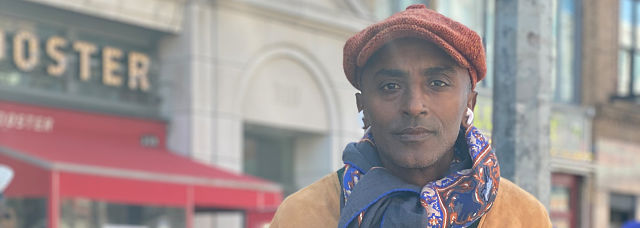 Marcus Samuelsson is a James Beard award-winning chef and restaurateur with numerous restaurants around the world. He is best known for Red Rooster, in Harlem, New York.
Marcus Samuelsson is a James Beard award-winning chef and restaurateur with numerous restaurants around the world. He is best known for Red Rooster, in Harlem, New York.
By Marcus Samuelsson as told to Nikki Vargas
Staying put to support those who live and work in the city, even during the pandemic.
This pandemic is the hardest thing that has ever hit me, my family, and all of us, because it’s such an unknown entity. We’ve lost co-workers, we’ve lost people in our communities that have been working and contributing for decades. I can’t even put it in words. That first or second week in March was very rough. We closed within the first 10 days. What I thought about right away was, what’s going to happen to my staff? In Scandinavia, I didn’t have to worry so much because there’s a working system that takes care of unemployment—it’s not something we have to recreate during a pandemic.
All other countries in the world that we like to compare ourselves with have a working unemployment system, so building it as we’re trying to figure everything out is very difficult. There are basic fundamental things this pandemic has shown that we need in a government. We need a right-size government, and we need a smart government. Not a government that just says all kinds of stuff, leaving us to figure out which one of those things matter and are of value.
I’m a chef that didn’t go anywhere. I stayed in Harlem. I stayed in New York to fight the pandemic. I say that because when you’re in it, when you see it every day, when you walk to work, it changes you. You can’t unsee what this does to you. When people say New York has emptied out, it hasn’t emptied out. If you go to the Bronx, if you go to Harlem, that’s where a lot of blue-collar workers live. America has been kept together by the essential workers like nurses, grocery-store workers, and people working on minimum wage. We owe that segment of the population a lot. It’s these people that have stayed here and worked to keep this city and country together.
We pretty quickly made the decision to turn our restaurants into community kitchens. Having the partnership with World Central Kitchen and José Andrés made it possible. This week we’ve served 50,000 meals to the neediest in Newark, Miami, and Harlem. With community kitchens, there’s a different level of service versus coming and sitting at the restaurant. But the steps of service are so similar, I knew from a hospitality and functionality level that we could deliver. What I love about the art of cooking is it’s applicable to the most basic and fundamental need to eat, but also to the most beautiful and esoteric art forms. This time, it was about figuring out how to feed the masses.
—
Related:
Marcus Samuelsson is Re-Building Communities in Harlem and Beyond
Join the conversation on Twitter and Facebook.

























